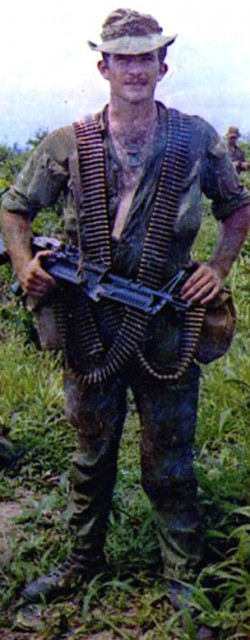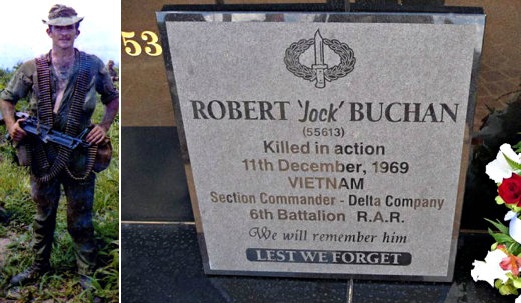Military historians are desperate to trace the relatives of Lance Corporal Robert Buchan, who served during the Vietnam War so that they could add his name to a new memorial built right next to the Vietnam Veterans Memorial wall in Washington DC.
Lance Corporal Robert Buchan, who military historians believed as a Vietnam War hero, was a native Scot but served along with the Australian troops in the Vietnam War in 1969. The war claimed his life as he was scouting enemy position.
Robert Buchan together with his family first emigrated in Australia in 1951; he was 13 at that time. After staying nine years in the country, they all went back to Scotland. But the Vietnam War hero decided to return to Australia alone in 1966. Two years after, Robert Buchan enlisted in the army and placed in the 6th battalion, the Royal Australian Regiment.
Originally a piper, he refused to join in the army’s band as he wanted to take part in a combat unit. The machine gunner from Dundee and was known as “Jock” among his comrades.
The Royal Australian Regiment participated in the Vietnam War in May 1969. December that same year, the group was able to locate a large repository of Viet Cong explosives at Phuoc Tuy. They were able to destroy it, but at the cost of some soldiers’ lives, including that of Vietnam War hero Robert Buchan.
According to the Australian military historian Richard Cousins, lance Corporal Robert Buchan was heading his group through a well-used track when his forward scout indicated that there was a bunker 15 meters ahead of them. He stopped the troop from moving forward and personally went on to investigate. He was directing a a second forward scout to take position on either side of the track when the enemies opened fire about ten meters away from where he was located. The rain of AK47 bullets killed the Vietnam War hero on the spot. Lance Corporal Robert Buchan was only 22 at that time.
Military historians investigating the death of Robert Buchan believe that if he had not stopped his platoon from going forward, many of his men may have been killed in the attack.
In 1987, 12 years after the Vietnam War ended, a Welcome Home parade was held in Sydney. Flags were presented to the families of the 521 Australian soldiers who died during the Vietnam War. The flag for Lance Corporal and Vietnam War hero Robert Buchan was never presented to his family. Mr. Cousins wants his family to have the memorable token for the bravery of their loved one.
Additionally, Mr. Cousins made mention of the center being built adjacent to the Vietnam Veterans Memorial in Washington DC. This edifice is in honor of the contributions made by Australia during the Vietnam War and will open in 2015.
The central feature of the center will be the Wall of Faces, a digital display of the photos of those who died during the conflict including the 521 Australian soldiers. Mr. Cousins together with another historian made contact with the platoon Robert Buchan led during the Vietnam War to get some of his photos and details about his life.

They are hoping to locate his relatives to then ask their permission to add his name in the memorial.
Mr. Cousins believe that the family of Vietnam War hero Robert Buchan lived in Perth in central Scotland. Search for them is concentrated in the said area.
The Vietnam War is among the longest and most disputed conflicts Australia took part on. The country sent 30 military advisers in 1962 but eventually, went on to commit 7,600 troops to take part in the conflict.
More than 500 soldiers never returned from the Vietnam War while over 3,000 were wounded. The Vietnamese government placed the estimates of the death toll of the Vietnam War at 3.1 million, the number, including civilians and soldier from both the warring sides.
